The Varnished Culture's Thumbnail Reviews
Regularly added bite-sized reviews about Literature, Art, Music & Film.
Voltaire said the secret of being boring is to say everything.
We do not wish to say everything or see everything; life, though long is too short for that.
We hope you take these little syntheses in the spirit of shared enthusiasm.
Tár

Directed by Todd Field (2022)
To err is human; to forgive, Divine; to cancel, de rigueur.
Lydia Tár (not her real name?) is a pianist, ethnomusicologist, composer, and the first female chief conductor of the Berlin Philharmonic. She’s as busy as a bee: at a festschrift, she plugs her new book to Adam Gopnik of the ‘New Yorker’ (they wouldn’t invite Steve Bannon, but this luvvie? No problem!) and she is preparing the forthcoming live recording of Mahler’s 5th. She’s teaching (and bullying) at Juilliard; lunching with a moneyman who wants to pick her brains; she’s hiring and firing; she’s leering at new talent, and ignoring the needy outreach of a young musician, Krista.
Then come unusual degrees of dissonance: Her ‘transactional relationships’ start falling apart – from marital troubles with wife Sharon, professional issues with PA Francesca and deputy conductor Sebastian (involving her mentor, Andris), an unrequited lunge for a young cellist Olga, and Krista suiciding. Lydia’s arrogance on the way to the top prompts swirling forces to pummel her on the way down: accusations cascade, of favouritism, sexual harassment and predatory conduct, bullying, spoliation of incriminating evidence, and marital insouciance. They all do her in eventually.
If not for two key factors, this film could have flopped completely. After all, the script is filled with things people would have liked to say (or not say) ex post facto: it is difficult to locate a single human one could admire; it is long, often opaque, and at times clichéd. What pull this piece into and near the head of the line are the delicious care taken in the direction, down to the very last detail, and the performances.
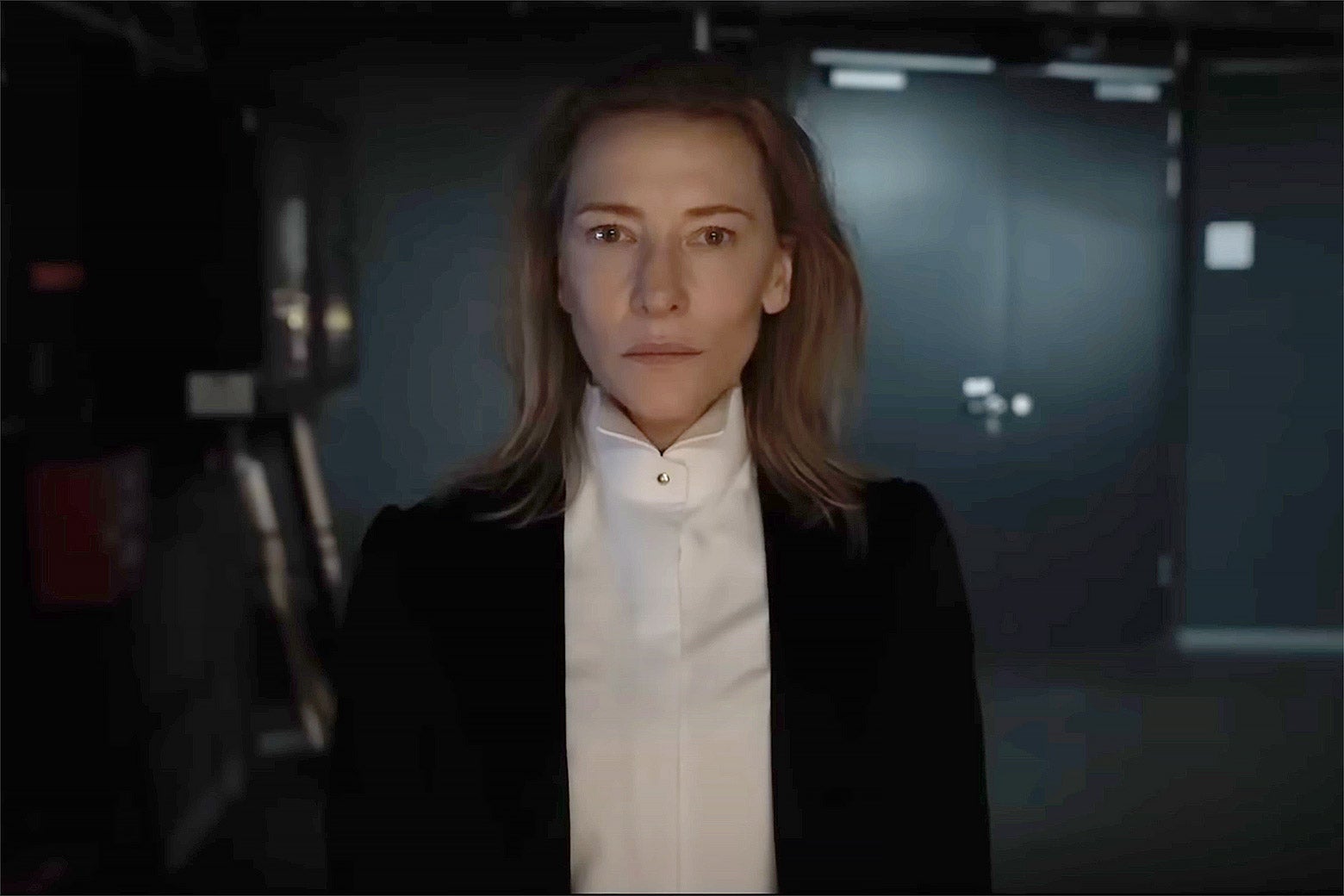
“I’m going to shirt-front this bastard…”
TVC has no wish, whatsoever, to meet Cate Blanchett – but clearly she is the best actor of the current generation. She’s virtually on screen all the time and manages to give us Lydia (Linda?) in full. It is a magnificent performance that never fails to convince, tasked as she is with not only portraying a leading conductor (not merely a matter of waving hands and sticks but full mental and physical respiration, the kind Alan Bates exhibits in The Shout), but responding to being subjected to the ominous, slightly surreal discordant sounds (like the broken string in The Cherry Orchard), images (weary sideways glances, SMS messages, a Handbag), physical twinges, and sundry horrific episodes strewn across Lydia’s path.
Likewise, the wheedling of Tár’s second conductor Sebastian (Allan Corduner), her treacherous PA, Francesca (Noémie Merlant), and patron/colleague Eliot Kaplan (Mark Strong), might have struck false but for the skill of these actors and the sure touch of the director. It is a pity that Field has junked more projects than Orson Welles, over the last couple of decades.
There are signs of political predilection here, to be sure, probably to augment Oscar-favour, if anyone still takes that seriously. For example, the ‘New York Post’ is traduced as a ‘rag’ (although Hunter’s real actual laptop has more credibility than the ‘edited’ version of Tár’s lesson at Juilliard uploaded to social media). In an interview, she mentions the Hebrew term “kavanah” which draws a snide reference to the evil conservative Supreme Court Justice of a similar name. The Me Too (Her Too?) references seem a progressive strawman here, where we are meant to side with the ludicrous BIPOC student. It surely is no surprise in 2023 that nasty conduct is an equal opportunity employment. Sex, Nazism, moral relativism, all get a thorough rinse here, and not necessarily in a good way. Me Too, and the outrages of Weinstein et al that gave rise to Me Too, emanate of course from the same sources, well presented here: human perfidy, human cupidity, human betrayal, human cruelty. (We do it so much better than the lower animals, don’t we? Good old us.)
‘Tellings Off’ – Notable ones in film include Gregory Peck to Hugh Marlowe in Twelve O’Clock High; John Mills to Richard Attenborough in Morning Departure; George C. Scott to Tim Considine in Patton; Al Pacino to Kevin Spacey in Glengarry Glen Ross. There are quite a few ‘tellings off’ in Tár ; the first (which we have alluded to above) being the somewhat over-freighted and expository scene where the conductor, in a class at Juilliard, mocks a student for rejecting the work of Bach because he was a white cis-gender male. It helps establish character and plot points, but demolishing a twit for confusing the singer with his song is taking candy from a baby. The other key telling-off is much more significant, and satisfying in a chilling way: Tár confronts a little bully in her daughter’s schoolyard.
Only a few other quibbles: whilst the motif of the badly-behaved, megalomaniacal conductor has the force of historical truth – think Toscanini and his smashed fob watch, Solti’s skull screaming, Fritz Reiner’s William-Wyler-like exhortation to a trumpeter to ‘Do it Again’, James Levine and his ‘inappropriate behaviour’ – we had difficulty accepting the deranged cathartic tantrum at the climactic live performance of Mahler’s 5th (even though there may be historical precedents). And surely, after a somewhat meandering set-up, her decline thereafter was a tad abrupt, (reduced to Staten Island and the Philippines, ye gods!) perhaps necessitated by the film’s length at 157 odd minutes? Finally, though touted by some as an examination of the creative impulse, it hardly does this (oddly, in the same way, Death in Venice also fails in this regard – perhaps only At Eternity’s Gate gets close to this elusive concept). But as an examination of power and its abuse, it succeeds splendidly.
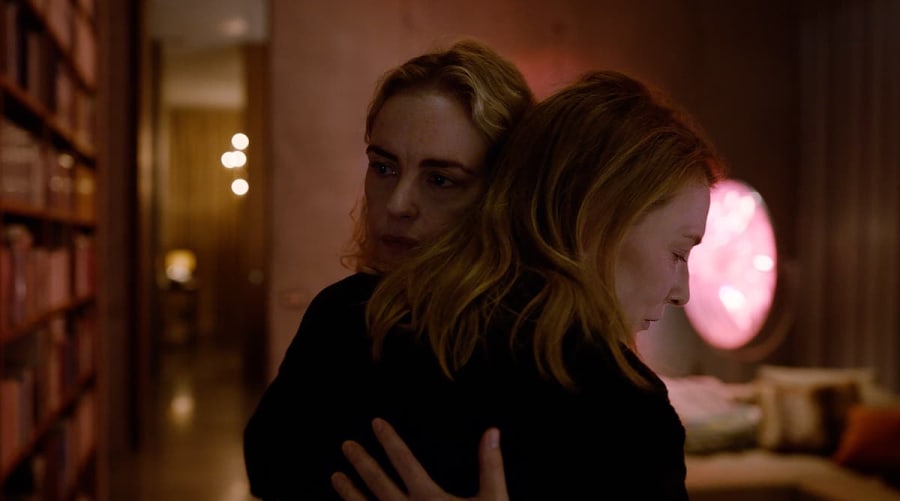
It was a hard day at the office
Amsterdam

(Directed by David O. Russell) (2022)
The judgment of eminent film critic David Stratton is, we suspect, affected by seeing everything. TVC perhaps suffers from the reverse circumstance: we don’t see very many films, because life is too short. We do try to guard against the impulse to stick to films we’ve already seen, and remind ourselves that it was ever the case that 90% of films made are rubbish. It is just that now the rubbish is even more nauseating in its freighted agitprop, the production quotas and standards that would make the Hays Office blanch (in a different way), and the tendency to infantilism.
David published his “Top Movies of 2022” list in “The Weekend Australian” (31/12/22):
Amsterdam
The Banshees of Inisherin
Belfast
Blonde
Decision to Leave
Good Luck to You, Leo Grande
Parallel Mothers
Quo Vadis Aida (sic)
Seriously Red
Three Thousand Years of Longing
We have seen 4 of the above, and would only agree that Quo Vadis, Aida? belongs on a best list. Belfast is wafer-thin fare smothered with a lavish dripping of indulgent, nostalgic povo-porn (the kind of thing we fear Spielberg is trying, on an upper-mittel-class level, with The Fabelmans). Parallel Mothers is a typical ho-hum piece from Pedro Almodóvar – it was lionized at Venice, which is always a ‘tell’.
Which brings us to Amsterdam.
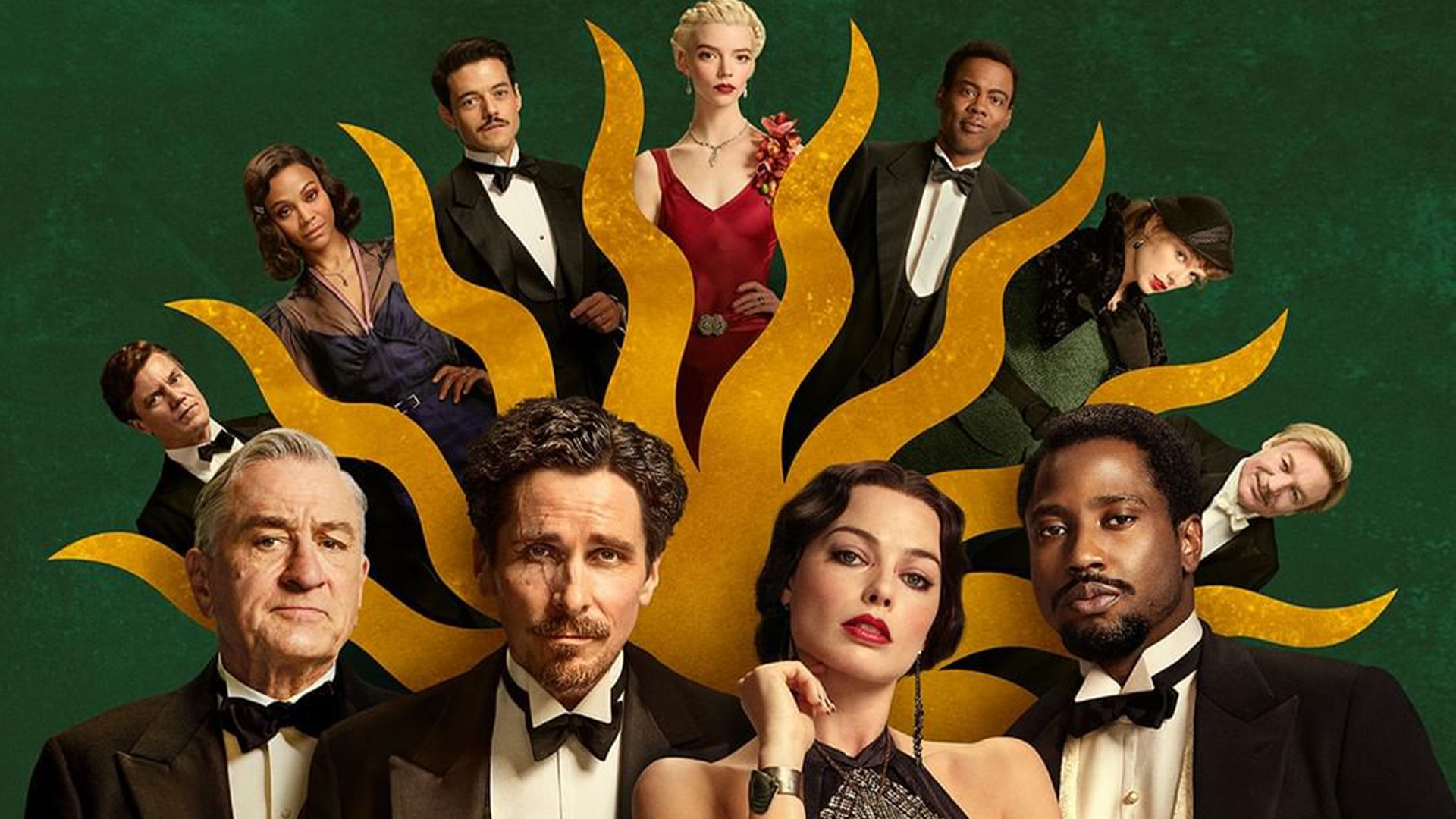
“WTF?”
Stratton says: “…for my money…the most underrated film of the year. I enjoyed this richly textured movie so much that I saw it twice over the space of a few days*. With its Hitchcockian blend of humour and suspense, and boasting an unusually fine cast – Christian Bale, Margot Robbie, John David Washington, Rami Malek, Anya Taylor-Joy plus Robert de (sic) Niro at his best, this has an intriguing plot inspired by real events – the fascist movement in pre-World War II America.” [* Perhaps he watched it the 2nd time to try to make sense of it.]
—————–
We can imagine the Amsterdam Pitch…
“It’s a sort-of Knives Out meets a dollop of Scoop with an ensemble cast like in Don’t Look Up.”
“What’s the peg?”
“January 6.”
“Now you’re talking!”
“Yeah but I’m making it a period allegory, see? Instead of the 1/6/21 insurrection infamy. So we focus on the so-called Business Plot of the 1930s, when rich white supremacists tried to take over government from FDR in a RWNJ coup. It takes a shot at the wrong side of Wall Street (not Democrat donors), Trump, Peter Thiel, Trump, the Tea Party, Trump, MAGA, Republicans, Elon Musk, and Trump. It’s got razy lacisim, gender outlaws, reparations, white-supremacy eugenics, a war romance, speeches about threats to democracy, murder mystery…”
“Murder? Is this an action thriller? I thought you said comedy.”
“It’s ALL THREE…plus so much more! and we’ve got Christian Bale signed. He’s always wanted to parody Woody Allen; well, Woody melded with Al Pacino.”
——————
We’ll spare you the full synopsis: let’s just record that Amsterdam is a witless, chaotic, heavy-handed, impenetrable omnishambles, studded with woke trash (and worthless cameos, by dozens of celebs, such as Taylor Swift). It doesn’t even succeed as a period piece: the whole mélange being drenched in fake sepia and House-of-Eliot-style fabrication. The music jars, much like those skits where they set Kamala Harris speeches to bongos. The script is unintelligible. The plot has been carelessly confected, ideas good and bad thrown into the Cuisinart. The attitudes and exchanges are painfully anachronistic. Imagine black boys saying this stuff, c.1933!
The performances are decidedly patchy: Margot Robbie and John David Washington, as the lovers, adopt long, fixed, vacant stares at each other, and at everyone else. Many of the supporting players spend time standing and staring also, as if awaiting direction. As do even the Brownshirts (yes, that’s right, Brownshirts). Bob De Niro does what he does best these days: appears. To sledgehammer home the Adam Schiff-approved script, Anya Taylor-Joy plays a bug-eyed cross between Eva Braun and Melania Trump, and Rami Malek seems to channel Rudi Giuliani. Chris Rock provides a screaming chorus. Many actors seem to have been cast based on their epidermis, or ability to provide declamatory exposition. Christian Bale, however, has clearly been cast to help us decide if this is the worst turn of his we’ve seen. His ludicrous, dopey, eye-rolling** performance is down there with his work in Vice, American Hustle and, of course, that monumental atrocity, Knight of Cups.
Amsterdam makes the top ten list. We agree with Mr. Stratton about that. Where we depart from him is in identifying the appropriate list. Worst Films of the Year is our choice for this farrago, made by alleged professionals. The cinema-going public seems to agree, based on theatre receipts: projected losses are said to be $97m. Go Woke, go Broke.
[** unfortunate, since the character is meant to have one glass eye.]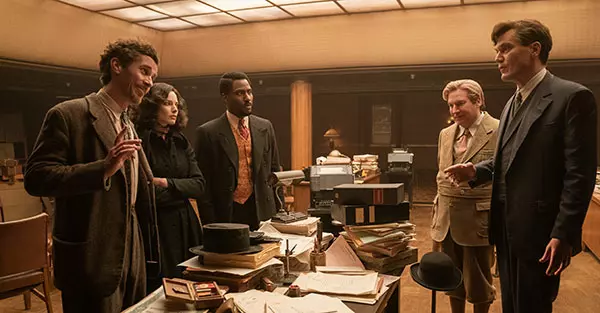
“Maybe Liz Cheney can explain all this…”
Breaking History
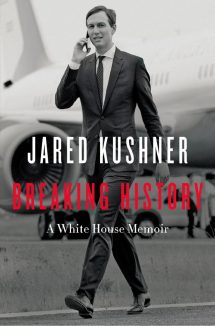
By Jared Kushner (2022)
Kushner is no prose stylist. But this tome is a valuable guide to the tour-of-duty of an outsider in a White House full of outsiders. It shows how a transactional background with amateur oversight, ego, and the Art of the Deal, can actually accomplish something in the Deep Swamp that is American federal executive governance. Take, for example, the Abraham Accords. The conventional wisdom, espoused by the likes of the never-right-but-never-in-doubt John Kerry, was that a Palestinian solution was a necessary pre-cursor to improvement of general Arab-Israeli relations. Yet the Trump administration, at Kushner’s suggestion, flipped that script and achieved an agreement for the normalisation of relations (recognition of sovereignty, full diplomatic relations and commercial activity) between Israel and the United Arab Emirates, Bahrain, Morocco, and Sudan. Whilst no doubt permeated by realpolitik – resembling something like the Nixon/Kissinger ‘triangulation’ play, only directed at Palestine and Iran – the Accords were a once-in-a-generation breakthrough in the troubled region, and would have earned any president, apart from The Donald, the Nobel Peace Prize.

Like Trump, Kushner was a deal-maker (together, they drove a fairly impressive NAFTA 2.0, did some counter-intuitive things on criminal justice reform, and handled Covid-19 reasonably, in retrospect). But as the ‘token’ liberal (and Jew) in the office, with nil experience in public administration, he was often blindsided, unused to bureaucratic inertia, out of his depth, and resented as the beneficiary of nepotism (he is Trump’s son-in-law). His editor at the New York Observer, which he bought in 2006, reportedly said of Kushner: “This guy doesn’t know what he doesn’t know.” That naivety helped him get embroiled in the Russian Collusion nonsense that distracted the Trump administration for a good chunk of its term, although he appears to have been blameless.
In the event, the book is worth reading as one of the small assortment of books about POTUS 45 that is not suffused with hysteria.

The White Lotus, Series 2, episodes 1 – 6 (director and writer Mike White) 2022

Those who were charmed and a little shocked by the intrigues of the first series of HBO’s The White Lotus, might come to series two with the wrong expectations. This series, set in a sumptuous Sicilian hotel in the eponymous chain, has little charm, but plenty of shocks.
It looks beautiful, some of the clothes are beautiful – although we’d like to know what Hayley Lu Richardson did to upset the the wardrobe, hair and makeup departments so much. Sadly, Murray Bartlett’s marvellous manager character did not survive series one, but the manager of this White Lotus, lovelorn, man-hating Valentina (the lovely Sabrina Impacciatore) provides what little humour and compassion there is in this sequel to date.
Most of the performances are fine. Jennifer Coolidge reappears as Tanya, left behind with her assistant when her gold-digging, philandering husband flees the hotel and their marriage. She is even larger, clumsier, more sleepy-eyed and vulnerable than in the first series. At the end of episode six we are worried about her future. We think that her friendship with the sophisticated Quentin (Tom Hollander) and his louche entourage might not be a good idea. Her miserable, lazy and rude assistant, Portia (the aforementioned Hayley Lu Richardson) might be able to help her, but she’s busy with a hideous English lout Jack (Leo Woodall – again, a sterling appearance in a thankless role).
Harper (Aubrey Plaza, a slightly less sneering plank than the one she perfected in Parks and Recreation) rivals Portia for Miserable Character of the series. Harper and her moping husband Ethan (Will Sharpe) play out the irritating plot device of a misunderstanding which could be cleared up in a minute if the protagonists spoke to each other like real people do. But no, each must keep a pointless secret and glare at the other behind his or her back. Ethan and Harper are on holiday with Cameron (Theo James) and Daphne (Meghann Fahy), both of whom Harper hates, even more than she despises her husband. Ethan has just sold his company for a lot of money and Cameron wants to give him financial advice.
Cameron cheats on Daphne, who pretends to cheat on him. As almost everyone in this series watches porn and cheats on their partner with whomever is around there are many curiously unerotic sex scenes, although the nude Freddie Mercury lookalike is interesting. There’s also much orange fake tan on display. Grubby-looking prostitutes Lucia (Simona Tabasco in a fright wig), and Mia (Beatrice Granno) swagger about the hotel in the ugliest skimpy clothes seen this side of Rihanna’s wardrobe. Their presence seems entirely gratuitous, other than to provide yet more tedious sex scenes and to enable Mia to tinkle the ivories and whisper ballads at the hotel’s bar. Granno must be related to the producers. Bert (F Murray Abraham) and Dominic (Michael Imperioli) are a sleazy father and son, who have come to Sicily together with Dominic’s son Albie (Adam DiMarco) (who has even less gorm than Tanya) to find distant relatives. Along the way of course the three get tangled-up with Lucia and Mia, and it couldn’t be uglier.
On the good side of the ledger – the opening credits and main theme (Renaissance (Main Title Theme) are eerie. An angry peasant woman uses an artichoke as a weapon. We do know from the first episode that some guests turn up dead, which creates suspense and interest in the final episode, but ultimately we don’t really care, because the production and its people are nasty and soulless.

The Comedians

Her Majesty’s Theatre, Adelaide, 19 November 2022
Comedy is hard. Stand-up comedy is very hard, and should be left to stand-up comedians. Alas, Mick Molloy, Sam Pang and Marty Sheargold are stand-up comedians like Ricky Gervais is a stand-up comedian: getting by, but not demonstrating a core skill. These three are well known for their amusing work on TV (‘The Front Bar’, ‘Have You Been Paying Attention?,’ ‘Fisk’) and radio. They are all likeable and funny, but somehow, one didn’t take away anything particularly witty or memorable: it seemed a parody of what was promised to be “a night (in our case, an afternoon) of no-holds-barred, good old-fashioned stand-up comedy.” It was two-drink-minimum comedy; unfortunately, The Varnished Culture could not get anywhere near the hopelessly understaffed and overcrowded bar before the show. The one professional, Lawrence Mooney, had the smoothest routine, though his material seemed a little frozen in the 1980s/90s. It is his personal tragedy (though our collective luck) that Malcolm Turnbull is no longer of relevance: his impersonation of that cocktail-party joke was one for the ages, but there’s no place for it now.
Which is not to say the show was a washout: there were laugh-out loud moments from all four players –
Molloy rubbed the crowd’s noses in the defeat of the Adelaide Crows in the 2017 Grand Final (P enjoyed this particularly, Richmond being his preferred VFL team) and recounted how after the game the pubs were so full that crowds of Tiger fans established a local drive-through as an actual venue, buying and consuming grog and chanting “We’re From Liquorland“;
Sam Pang riffed on the Asian Thing, which he does very well – we liked his golf round with aged club member ‘Herb’ who thought he may have been a Japanese soldier – Pang’s recurrent loathing of Anh Do was a highlight, and his idea for a re-make of “Diff’rent Strokes,” involving people who had actually suffered different strokes, was funny in a mean way;
Marty Sheargold was the best of the first three – he has a good grumpy-old-man act, and the story about his Dad chasing Sheargold’s brother around the kitchen table, after the lad cut out a picture for a school essay from the family’s treasured World Book Encyclopedia, was splendid enough to evoke memories of Carl Barron’s act;
Lawrence Mooney’s stuff comes and goes, but he is seamless and quick, so that hits cover misses. His venerable review, of why more wives don’t murder more husbands, was richly enlivened by the one about her as designated driver having roundabouts explained, and revving the car while drunken hubby, en route to open the garage door at home, risks mortal injury dancing in front of the headlights – shades of Whatever Happened to Baby Jane?
– but the Rat Pack they ain’t.

Bridge of Dreams

OzAsia Festival, Adelaide, 27 October 2022
It may be time to revisit Kipling’s dictum: “East is East, and West is West, and never the twain shall meet.” “Bridge of Dreams” is an unlikely but pretty impressive combination of Hindustani music and big band progressive jazz.
At Her Majesty’s Theatre in Adelaide, Saxophonist, composer, and improviser Sandy Evans collaborated with tabla (a pair of twin hand drums from the Indian subcontinent, since the 18th century the principal percussion instrument in Hindustani classical music) players Aneesh Pradhan and Bobby Singh, singer Shubha Mudgal, harmonium player Sudhir Nayak, and the Sirens Big Band, an all-female jazz ensemble featuring a brass section that would be the envy of the Hunters and Collectors or Chicago.
The performance started (after the tedious welcome to country and assertion of first “nations” sovereignty) with a chant to Mother Earth (or Gaia). Mudgal, though miked, has a strong voice and sat centre stage, a perfect choice for a North-Indian staging of The Ring (as Erda, of course). The tabla players, harmonium, double-bass and piano were stage left; drums and percussion centre-rear; the jazz ensemble to the right, with Evans on various instruments (including impressive clarinet work) taking the traditional conductor’s space and role. The performers were impeccable – the pieces combined the traditional Indian homages to imagination that can be traced a myriad years back to the Dravidian peoples, with the meandering tendencies of traditional jazz that wend their way in the style of the late Scratchy Impasto. TVC, not having any surtitles and lumbered with something of a tin ear, thought at times the repetition gave off the sense that ‘Slaughter on 10th Avenue’ had been stirred in with ‘It Ain’t Half Hot Mum,’ but still, and seriously, the pieces showed clear virtuosity and were quite impressive.
For TVC, the highlights were Deepening of the Red Sun, from a text by the mystic poet Kabir, a mystical jazz fusion that built slowly, almost ponderously (like a Peter Gabriel song), but which was profound for all that – another piece that featured percussion (including via piano) seeming like the beating of a heart, a great piano solo and with Mudgal almost venturing into skat – the last piece before intermission, “Joyous Rain,” a virtual rocker in which the trombone section got to shine (ignoring Wagner’s joke about not looking at the trombonists, as it only encourages them) – a boppy Bollywood-inspired number reminiscent of feature music from “The Birdcage” – “Tabla Spiral,” where Pradhan and Singh ‘spoke’ to each other both through their instruments and song – and “Arms of Imagination” that blared as brightly as Benny Goodman’s band on steroids. The synergy between eastern and western styles and instruments was a revelation, and the players’ enthusiasm was infectious. A standing ovation at close.
Your correspondent pleads ignorance of most things Indian. Yes, he doesn’t like cricket – he loves it. He is reading Midnight’s Children. His nephew lived in a Monastery in Sera for several years. He thinks Māru-Gurjara architecture comprise some of the greatest built-art in the world. But he can’t speak Hindustani and is not well acquainted with the subcontinent’s thought and culture. Which is why festivals such as OzAsia are so important: they help to build a bridge between you and that which is not you, and so pass from ignorance to appreciation and understanding.
As Kipling might conclude: “They have looked each other between the eyes, and there they found no fault.”

Kabir Sahib
Moonage Daydream
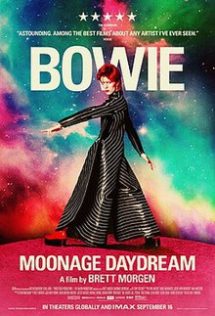
(Written and directed by Brett Morgen) (2022)
The great David Bowie died in 2016. He’d have liked this ‘documentary,’ we suspect, because like him, it is sui generis, an assault on the eyes, ears, and (pace his philosophical meanderings) the mind, that satisfies for almost all of its 2 hours and 15 minutes. With a mountain of footage and full estate authorisation, Morgen has lovingly assembled a vibrant, moving monument to the peripatetic searcher and androgynous transformer who was Starman, Ziggy Stardust, Cracked Actor, DJ, the Man Who Sold the World, the Space Oddity, a Young American, a Hero, and more – a shape shifter who went from ashes to ashes.
Inevitably, there are slight repetitions and more substantially, challenging excisions in the film, but really, so what? The editing is superb, there are no annoying intrusions, and Bowie himself, changing over the course of the piece from not only a deliberate strategy, but by inevitable age and experience, is fascinating as always. And remember, they’re not bisexual shoes, “they’re shoe shoes, silly!”

The Great Degeneration

(How Institutions Decay and Economies Die) (Niall Ferguson, 2014)
This compendium of Reith Lectures by historian Niall Ferguson given in 2012 is no less topical a decade later. In fact it is a fortiori, given that the subsequent years have borne out many of the predictions made. For example, the author quotes ‘cliometrician’ Peter Turchin predicting “the next instability peak [of violence] should occur in the United States around 2020.”
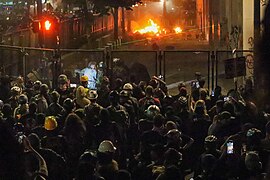
Orwell’s pigs have taken over Manor Farm: “What Charles Murray has called the ‘cognitive elite’, educated at exclusive private universities, intermarried and congregated in a few ‘super zip codes’, looks increasingly like a new caste, equipped with the wealth and power to override the effects of mean reversion in human reproduction, so that even their dimmer progeny inherit their lifestyle.” This ruling elite, pretending to be left or right, is in fact either. Rather, its members are nihilistic opportunists, more-or-less unaccountable, incapable of, and unwilling to try, improving the lives of their untermensch.

Regeneration will not come from that quarter. Ferguson knows this, and more impressively, proves this in his excellent little book. Instead, he revives the fine old idea of reclaiming those timeworn institutions that have stood western civilisation in good stead prior to their impregnation by Marxist fruit flies. Davos man has had the benefit of two real time studies of the stationary state: “Essentially, we took two peoples – the Koreans and the Germans – and divided them in two. South Koreans and West Germans got capitalist institutions; North Koreans and East Germans got communist ones. The divergence that occurred in the space of just a few decades was enormous.” Yet the elites like aspects of the latter because they like command and control and they like limited access. Which is why Gramsci and Dutschke et al have subverted the institutions that were constructed during a more enlightened and optimistic epoch: Parliamentary Democracy existing vis-à-vis the people in a social partnership; free markets, free and enforceable bargains and the rule of law (not the ‘rule of lawyers‘); sensible, non-oppressive and non-explosive regulation; a wisely apprehensive central bank that takes away the punchbowl before the party gets out of control; and “civil society” being organic groups of citizens forming to solve their own problems without recourse to ces princes qui nous gouvernent. We can all see how these monuments have corroded.
Ferguson asks: “So what exactly is going on? …narrowly economic explanations that focus on the impact of financial forces (‘de-leveraging’), international integration (‘globalization’), the role of information technology (‘off-shoring’ and ‘outsourcing’) or fiscal policy (‘stimulus’ versus ‘austerity’) do not offer sufficient explanations. We need to delve into the history of institutions.”
And he concludes with a take on President Obama’s second inauguration speech, when he venerated big government as the answer (a la Hillary Clinton’s “It takes a village to raise a child”) and comments: “It is bad enough to see state capitalism touted as an economic model by the Chinese Communist Party. But to hear it deployed by the President of the United States as a rhetorical trope nearly devoid of practical content makes..one..pine for the glad, confident morning of 1989 – when it really seemed the West had won, and a great regeneration had begun.”
We have spoken at some length about this topic, from the decay in the arts, sciences and academia, in its various branches and streams of thought. And again. We have bewailed the diminution of freedom, here, there, up, under, north, south, east, far east and west. We’ve talked about polarization. It is gratifying therefore to find someone who can coolly appraise a problem and identify what must needs fixing. Rather than bang on (as TVC has) about the pretty pass to which we’ve come, let’s look at our hallowed institutions, as Ferguson suggests, and start trying to fix them. But you’d better bring rubber gloves and use a strong disinfectant, because it won’t be easy and there’s at least five decades’ worth of sabotage to correct.
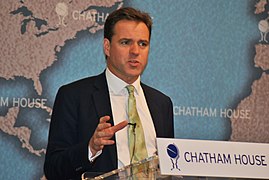
Straight Line Crazy

Written by David Hare / Directed by Nicholas Hytner – Bridge Theatre, London, 17 September, 2022
Breaking news: Fat Book inspires Thin Play. Robert Caro’s monumental work about Robert Moses, reviewed by us in March, gave us a character of Shakespearian complexity. Alas, David Hare is not Shakespeare. Not even close. In his play he cherry-picks two episodes in the powerful public servant’s hectic agenda: an expressway cutting a line through estates of the leisured and treasured on Long Island (Moses is depicted having a slanging match with Henry Vanderbilt). The First Act, declamatory, expository, and facile, shows Ralph Fiennes, a fine actor (Moses), Guy Paul (Vanderbilt) and Danny Webb (Governor Al Smith) revivifying the old saw about dramatic theatre – “Shouting at Night.”
Having shown Moses stand up for the little man, Act Two propels antagonists into view to show his burgeoning corruption, dislike of ‘the lesser races’ and women in general (including oddly, according to Hare, his first wife). The antagonists are architectural journalist and writer Jane Jacobs (a real person, played quite well by Helen Schlesinger) and a made-up plot device, Finnuala Connell (Siobhán Cullen), whose role is to tut-tut like the Irish lass in Touched by an Angel. Jacobs, who doesn’t even make it into Caro’s thousand pages, was a key driver of the Committee to Save Washington Square Park – one of Moses’ few early defeats. And Ms. Connell, a planner and general factotum, joins with fervour in the speech-making on plentiful offer. The conclusion telescopes undeveloped ideas and finishes with a jolt – or rather, a thud. A disappointing piece.
Continue Reading →“This never happened to the other fellow”

The Music of James Bond with George Lazenby
By Guest Reviewer David Ross
My parents used to receive coarse brown envelopes in the mail bearing the enigmatic label ‘OHMS’, but invariably containing something disappointing (most often a bill). How much more exciting to be On Her Majesty’s Secret Service, as George Lazenby was in 1969. Conductor, Nicholas Buc, took a scaled-back ASO through a selection of Bond themes in chronological order from the instantly recognisable theme written by Monty Norman for the 1962 release of Dr. No to the latest outing of 007, No Time to Die. Breaking up the musical programme were two short interviews with the only Australian Bond.
The decision to present the music in chronological order may have been a mistake. Perhaps I am showing my own age, but it’s hard to see how anything can creditably follow Shirley Bassey’s two Bond themes: Diamonds are Forever, and Goldfinger. Luke Kennedy and Bonnie Anderson were the soloists and both gave enjoyable performances. Anderson gave solid performances of themes originally sung by Bassey and Tina Turner, but then blotted her copybook by nominating Skyfall as her favourite Bond theme. Kennedy’s spinning and tossing of the microphone was unnecessarily distracting, and I found his switch from tenor to falsetto in one of the newer Bond themes rather abrupt. The show finished with an encore in which it was apparent that Louis Armstrong’s We Have All the Time in the World was not well suited to Kennedy’s voice. The ASO seemed to enjoy the change of repertoire and put in a solid performance.
Lazenby, now 83 years old, was the star attraction. It is remarkable that a man could draw a crowd simply because of a few months’ work done more than half a century ago. Surely this is testament to the enduring success of a movie franchise that is far greater than the sum of its parts. Half of the audience was not yet born in 1969 when Lazenby’s Bond hit the screen. Perhaps a peculiar sort of patriotism drives us to show our support for the little Aussie battler who won the prize of being Bond. And surely many of us hoped to hear a few salacious details, in which regard Lazenby was only too happy to oblige: not since Don Giovanni did a man catalogue his sexual conquests with such relish. Like Austin Powers (a back-handed tribute to Bond), Lazenby is a man who has failed to move with the times. Perhaps this is part of Lazenby’s stage persona, but Austin Powers (The Spy Who Shagged Me) may have borrowed more than the jabot from Lazenby’s Bond. Lazenby was wearing a dinner suit for the evening, but the tie was missing, and any vestige of formality was dispelled by what appeared to be a comfy pair of slippers. He cut a rather tragic figure, more Sir Les Patterson than Commander James Bond, but there were moments when we glimpsed the wit and audacity that enabled a car salesman with no acting experience to land one of the most prized parts in cinema.
Perhaps Lazenby never took the job seriously, and the attitude that won him the role was in the end also why he made only one film. Ian Fleming’s character, on the other hand, has moved with the times and had enduring appeal, as has the music that is an integral part of the Bond formula.




